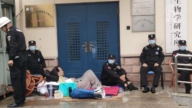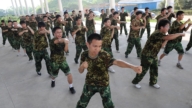【新唐人2011年3月15日讯】大陆国家统计局公布了2月份的经济数据。其中,消费者物价指数(CPI)同比上涨4.9%,高于市场预期。而衡量后续通胀压力的生产者物价指数(PPI),更是创下2008年9月份以来的新高,飙升到7.2%。外界担忧,大陆的通胀压力短期难以减弱,央行越发处于两难境地。
官方在3月11号公布的2月份经济数据显示,当局近几个月来采取的遏制通胀措施,并没有能够扭转通胀走势。2月份消费者物价指数(CPI)同比上涨4.9%,涨幅与1月份持平,这也是连续两个月CPI超出当局4%的调控目标。
而衡量后续通胀压力的重要指标——生产者物价指数(PPI)同比上涨了7.2%,创下2008年9月以来的新高。 这两项数据高于专家的预测,也令宣称“2月份CPI有望回落”的官方感觉意外。但北京经济学者郭玉闪在接受《自由亚洲电台》采访时指出,真实的通胀情况比官方发布的数据要严峻得多。
郭玉闪:“通货膨胀这个形势现在还是特别严峻的,不能只看CPI。现在这个物价指数有重大缺陷,漏了很多重要指标;而且像房价,是没有直接算进去的;反映通货膨胀是不够全面的。”
对于通胀上涨的原因,官方和专家们的看法则大不相同。国家统计局发言人盛来运表示,中国新年的影响促使食品价格上涨11%,是拉高2月份通胀率的主要原因。
中国经济问题专家、泛美银团副总裁草庵居士则认为,通胀的主要原因是中共当局发行货币过多,造成流动性过剩;另外,国际石油价格的上涨也起到一定推动作用。
美国《华尔街日报》援引HIS(Global Insight)的分析师桑顿(Alistair Thornton)的话说,目前中国通胀还没有到达峰值,后续效应将在未来几个月显现。另外,因为国际油价的冲击、大量的银行贷款,CPI将会被继续推高。
美国银行美林证券(Bank of America Merrill Lynch)的经济学家陆挺,则警告大陆当局“提高警惕”,3月份CPI同比涨幅很可能达到5.5%。
此前,中共当局宣称,要把稳定物价作为宏观调控的首要任务,希望在2011年将通胀率控制在4%以内。 美国“经济展望”公司的首席全球经济学家伯纳德•鲍莫尔(Bernard Baumohl)对《美国之音》表示,中共有3个工具来遏制通胀,分别是:提高利率;提高银行准备金率;和人民币升值。当局曾多次提高利率和银行准备金率,但收效甚微,剩下的办法只能是加快人民币升值。
他强调,目前中国经济面临的最大威胁,不是货币升值造成的出口下降,而是不断上涨的通货膨胀。尽管央行不情愿,形势将迫使央行加快人民币升值。
新唐人记者李谦、柏妮综合报导。
China’s Inflation Dilemma
China’s National Bureau of Statistics
recently released February’s economic data.
CPI rose 4.9% since last year, exceeding
expectations. A measure of inflation pressure,
producer price index (PPI) rose 7.2%,
a new high since October 2008.
There are concerns that the inflation pressure
in China cannot be mitigated in the short term,
and China’s Central Bank will be in a dilemma.
The February economic statistics released
on March 11 show that the government’s measures
in recent months did not curb the rate of inflation.
February’s CPI rose 4.9% since last year,
at the same rate as in January 2011.
The target rate of 4% was exceeded twice in a row.
The PPI, an important measure of the
inflation pressure, rose 7.2% since last year,
a new high since October 2008.
With 2 indices above economists’ expectations,
and after declaring that
“February’s CPI is expected to drop”,
the authorities are surprised, too.
In Beijing, economist Guo Yushan
told Radio Free Asia, the real inflation
was more severe than the official data.
Guo Yushan: “The current inflation is still severe.
We cannot focus only on the CPI.
There are fatal flaws in this index, which leave out
many critical factors, including house prices,
so it cannot comprehensively reflect the inflation.”
Economists and authorities cannot agree on the
reasons behind the current inflation.
National Bureau of Statistics spokesman,
Cheng Laiyun, said that food prices rose 11%
in February due to the New Year. It was
the main cause behind the high inflation that month.
Chinese economy expert and VP of Pan-America
Capital Inc., Caoan Jushi, believed the main reason
was the over-issuance of currency by the authorities,
which resulted in excess liquidity.
The increase of oil price was a factor, too.
Wall Street Journal quoted Alistair Thornton,
an analyst, at HIS Global Insight, saying that
China’s inflation hadn’t reached its top yet.
The after effects would occur in a few months.
In addition, high oil prices and the large quantity of
bank loans would push the CPI even higher.
Lu Ting, an economist at
Bank of America Merrill Lynch, warned
the Chinese authorities to “be alert”, because
the increase of CPI in March might reach 5.5%.
Previously, the CCP regime declared
price stabilization to be their main
macroeconomic control objective,
and hoped to curb the inflation rate within 4%.
Bernard Baumohl, chief global economist at
the Economic Outlook Group, told Voice of America,
that the CCP could control inflation
by raising interest rates, bank reserve ratio,
and RMB exchange rate.
The authorities tried the first 2 ways to no avail.
What remains is RMB appreciation.
He stressed that the current biggest threat
to China’s economy was not the reduced exports
due to RMB appreciation, but the soaring inflation.
Current circumstances would force
the Central Bank to appreciate
China’s currency faster than it wants.
NTD reporters Li Qian and Bo Ni





























